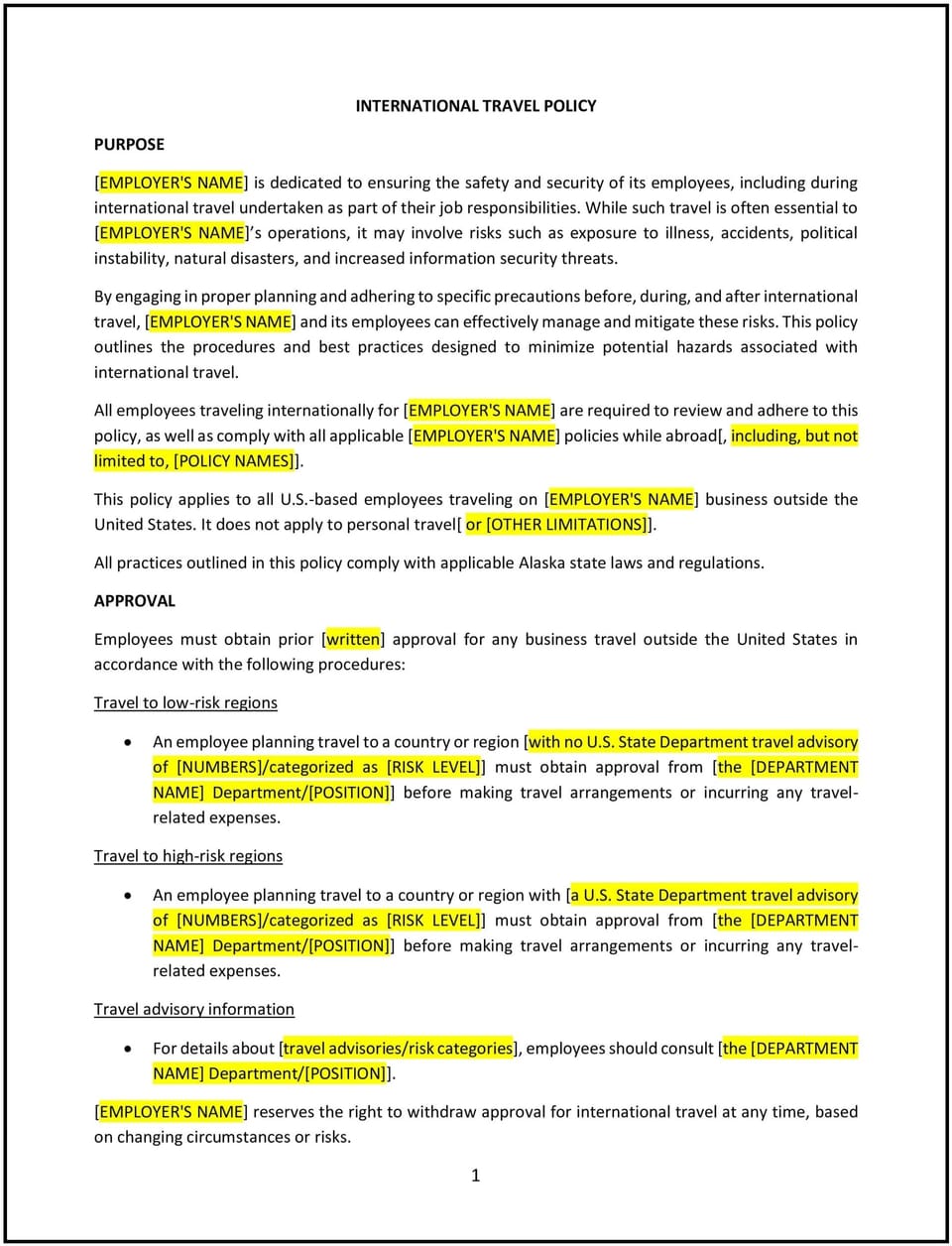International travel policy (Alaska): Free template

International travel policy (Alaska)
In Alaska, an international travel policy establishes clear guidelines for employees traveling abroad for business purposes. This policy ensures that travel arrangements are efficient, safe, and compliant with company standards while providing employees with the resources they need to represent the organization effectively. By implementing this policy, businesses can streamline travel planning, reduce risks, and manage costs associated with international business trips.
Given Alaska’s geographic location and potential challenges with connectivity or transportation, businesses may need to include provisions for extended travel times and specific logistical considerations.
How to use this international travel policy (Alaska)
- Define travel approval procedures: Specify the steps employees must follow to obtain approval for international travel, including pre-approval forms and management sign-off.
- Include expense guidelines: Provide clear instructions for reimbursable expenses, such as airfare, lodging, meals, and transportation, and set budget limits to manage costs.
- Address safety measures: Outline health and safety precautions, including obtaining travel insurance, adhering to local regulations, and emergency contact procedures.
- Clarify documentation requirements: Specify required travel documents, such as passports, visas, and vaccination records, and provide resources for obtaining them.
- Set reporting expectations: Establish guidelines for reporting on travel outcomes, such as submitting trip reports or debriefing with management upon return.
Benefits of using an international travel policy (Alaska)
An international travel policy offers numerous advantages for businesses in Alaska. Here’s how it helps:
- Enhances efficiency: Streamlines the travel planning process, ensuring trips are well-organized and aligned with business goals.
- Manages costs: Sets clear expense guidelines to control travel budgets and reduce unnecessary expenditures.
- Ensures safety: Provides employees with resources and protocols to stay safe and prepared during international travel.
- Supports compliance: Helps businesses adhere to local and international regulations, such as visa requirements and tax implications.
- Builds professionalism: Ensures employees represent the company consistently and effectively while traveling abroad.
Tips for using an international travel policy (Alaska)
- Adapt to local logistics: Address potential travel challenges unique to Alaska, such as extended travel times or limited connectivity in remote areas.
- Leverage technology: Use travel management tools to streamline booking, expense tracking, and communication during trips.
- Plan for emergencies: Include a contingency plan for emergencies, such as lost passports, health issues, or political instability in the destination country.
- Promote cultural awareness: Provide employees with resources or training to understand local customs and business etiquette, ensuring successful interactions abroad.
- Regularly review: Update the policy to reflect changes in global travel regulations, company practices, or employee feedback.
Q: What expenses are covered under this policy?
A: Covered expenses typically include airfare, lodging, meals, transportation, travel insurance, and necessary business-related costs, as outlined in the policy.
Q: How should employees obtain travel approvals?
A: Employees should submit a pre-approval request to their manager or designated approver, including details such as purpose, budget, and itinerary.
Q: What safety measures are recommended for international travel?
A: Employees should obtain travel insurance, follow local regulations, carry emergency contact information, and review safety resources provided by the company.
Q: How can businesses ensure compliance with visa and documentation requirements?
A: Provide employees with resources or assistance to obtain necessary documents, such as visas or vaccination records, well in advance of travel.
Q: How often should this policy be reviewed?
A: The policy should be reviewed annually or whenever significant changes occur in travel regulations, company operations, or global conditions.
This article contains general legal information and does not contain legal advice. Cobrief is not a law firm or a substitute for an attorney or law firm. The law is complex and changes often. For legal advice, please ask a lawyer.


